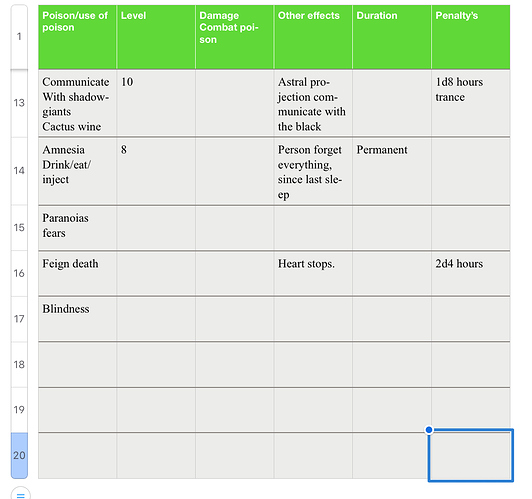Anyone have any Dark Sun themed fantasy drugs in game? Care to share the details?
How about Laq? It was in the books by Lynn Abbey.
Had a dried herb based drug called Un Chey that was snorted. Gave a bonus to initiative for a random number of hours (1d4), but the player was fatigued for the remainder of the day unless they took more.
Planning on running Last Stand at Outpost 3. They have ‘redleaf’ as an addictive substance.
Not finished yet
I tried to spice the bard class up, since they don’t have spells anymore
Tell me what you think?
Well for starters I do include opium as a popular drug for the wealthy that also sees medicinal use as a painkiller. Only apothecaries and alchemists are usually allowed to own opiates, but the nobility of most city states usually has an understanding with the templar.
That being said, a big question that has to be answered with athasian drugs is where they can be grown. Poppies I can see doing well in the Ivory Triangle as well as the fertile lands surrounding Raam (bonus points for Raam being based on India). I’m not as sure about the mud flats surrounding Draj, but it is certainly a land where you could see more interesting plants grow.
Of course another fun option is to use certain venomous athasian critters as the source of rare drugs, I can see these animals being an ingredient rather than the whole package. But I also enjoy the image of someone thinking they can go for a trip by licking that poison rock lizard.
I’ve also polished up rules for Esperweed and had the alchemists of my setting refine it into a more stable form known as Silver Dust. Most city states outlaw anyone that isn’t a liscensed psion from possessing this stuff since allowing your citizens to obtain random psychic powers does not a stable society make. The rules for both are below, using 2e rules that can be easily adapted to other editions with a little tweaking.
Esperweed: Natives of Athas have discovered that, when eaten, the roots of esperweed can boost psionic powers to very high levels. This boost is fairly short-lived, lasting for only 1 turn.
When the esperweed root is eaten, psionicists (single and multi-/dual-classed) have their psionic powers boosted the equivalent of 5 experience levels. The player should calculate the number of additional psionic strength points the character gains and determine which new sciences and devotions are gained (roll on the Wild Talent Tables). The character does not gain any additional disciplines. Eating esperweed also gives a psionicist character more control of his powers. All power scores are increased by +3 for the same duration as the psionic power boost (10 minutes).
Wild talents who eat esperweed also gain a boost in their psionic power. Their power score is increased by +2, and the character receives an additional 20 PSPs.
While esperweed is very useful to psionic creatures and characters, repeated use can also be detrimental. Creatures can eat esperweed and enjoy its psionic boosting capabilities a number of times equal to their Hit Dice (or current experience level) without any ill effects. For each use beyond that, however, the creature’s or character’s psionic ability rapidly fades. Each excess use reduces the creature’s psionic ability by the equivalent of two experience levels. This reduction is permanent, but each reduction can be reversed by use of a restoration spell. Once a creature’s psionic ability is reduced to 0 level, the creature permanently loses its psionics.
It should be noted, however, that esperweed only retains its psionic boosting properties for a limited time. A root will retain its effectiveness for one week after being picked, after which time its potency fades quickly into nothingness. For this reason, esperweeds are usually transported in pots to keep the plant alive for as long as possible.
Silver Dust: A strange drug of refined esperweed, it supposedly was first crafted by monastic orders of psions seeking greater understanding of the Way. Eventually the means of crafting this drug fell into the hands of men seeking to profit off this drug’s power. Today it is believed to be refined by all manners of men, from dune traders houses, to thieves’ guilds, to even the private gardens of the sorcerer kings themselves if rumors are to be believed.
After silver dust is snorted a DC 12 save vs Poison must be made. Failure results in nausea for one minute. If the save is made, the eater has managed keep the esperweed down, taking 1d4 points of Strength damage, but you also begin to regain one power point per minute, up to 10% above your normal power point limit (round down). You also gain the empathy power as a psi‐like ability that can be used once per day. Manifester level is equal to 1/2 level (minimum 1st). These benefits last for one hour, after which you lose all remaining power points above your limit. These power points are spent first when manifesting powers (much like temporary hit points).
(Note: Silver Dust was inspired by 3e’s take on Esperweed’s mechanics, so credit where credit is due)
Githweed. Githweed is a broad-leafed plant that grows low to the ground, usually as a peripheral crop, in cultivated fields. Once mature, the leaves are cut, collected and hung to dry. Once dried, the leaves are rolled together and sold in a bundle. Small pieces, known as “scrap”, are torn from the bundle and are placed inside the mouth, stuffed between the gums and cheek. As this clump of githweed begins to regain moisture, the natural toxins of the plant diffuse and are quickly absorbed into the blood stream and nervous system. Users experience feelings of relaxation and calmness before falling into a semi-unconscious euphoria. Githweed is quite addictive, and over time, users becomes more and more dependent upon it. This drug requires continuous use in order to avoid the pain of withdrawal symptoms.
More importantly, however, is the fact that while under the influence of githweed, a person’s psionic activity slows to such a point that they are unintentionally able to resist attempts of telepathic probes or projections; making any sort of telepathic connection to their minds very difficult – a quality that irritates and frustrates the Templars to no end.
Eventually, githweed addicts are driven to theft and petty crime in order to support their githweed habit, and also begin to bear the unmistakable signs of their addiction; teeth stained brown, raw, red mouth sores, raspy throats, a reduced sense of smell and taste, problems with simple memory and learning abilities, as well as loss of coordination.
It is not uncommon to find githweed addicts stumbling throughout the back alleyways and slums of the markets, confused, belligerent, and crazed. They become a nuisance, as Templars attempt to enforce the laws prohibiting githweeds’ use but are reluctant to imprison the addicts because they are unproductive in either the brick pits or labor camps, and are extremely difficult to control psionicly; they are merely a drain on already limited resources of food, supervision and money.
Githweed Stats
Type: Ingested, CON save DC 10; addiction save DC 20
Side Effects: Githweed user’s gain advantage on defense against any type of telepathic power.
Primary Effects: After 1d6 rounds of ingestion, the user becomes incapacitated and slips into unconsciousness for 1d4 hours.
Secondary Effects: Reduced sensory faculties and loss of coordination.
Overdose: If used more than four times before a rest, the user becomes catatonic.
Slaking Period: 2 days
Craft: None, githweed is cultivated
Price: 2 bits per bundle (6 uses); price may vary
I remember clearly my DM includes an esperweed junkie on our travels, also he planned to bring drugs similar to the ones you can see on Dune´s novels such as spice (who will grant or booster teleportation psionics) and that purple wine i not remember its name (who also grant or booster psionics)

